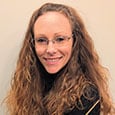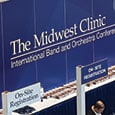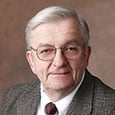“When you carry your instrument, it will carry you.”
Throughout the years, students across Kentucky have been fortunate enough to have experienced that motto and the fierce and fabulous voice behind it. Linda Pulley leads young people down a pathway that inspires them to achieve musical excellence. Pulley’s successes in the band room have resulted in being a recipient of the 2011 Grammy Signature School Enterprise Award with the Iroquois High School Band, 2024 KMEA Conference performance with the Noe Middle School Jazz Band, and having the Noe Middle School Symphonic Band and Jazz Band be selected to perform at the 2025 MBDNA National Concert and Jazz Band Invitational. Linda Pulley is currently serving her 19th year as a band director in Jefferson County Public Schools (Iroquois High School, 2005-2020 and Noe Middle School, 2020 – present) both in Louisville, Kentucky. – Heather Dipasquale
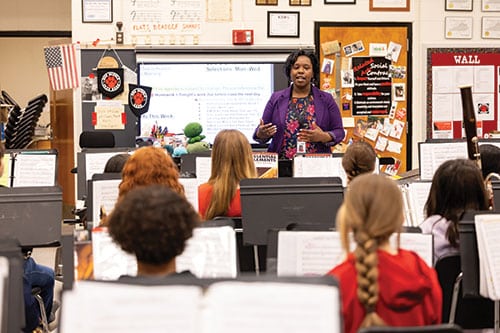
How did you get started in music?
I joined the band in 6th grade in a small town called Morganfield, Kentucky. There were fewer than 4,000 people in my childhood hometown with maybe four stoplights. I already had a musical influence in my home, with my dad singing and playing piano and guitar, and my siblings being involved in the arts. My sister Tamara was in the band, Angela was in the choir, and my brother Alton in visual art. We always appreciated the arts and sports in our home. I played in band and also earned two state runner-up titles with my high school track team. I was known for throwing shot put and discus, and my discus record at the high school has stood since 1999. However, I knew that joining the band was a safe place for me, an opportunity to try something new.
In the spring of 1992, the middle and high school band directors in our town visited Morganfield Elementary to recruit for the 6th-grade band. I was so happy to learn about the band and join something that my friends were not doing. I wanted to do something different without distractions or judgment.
In the fall of 1992, I went to my first band meeting, excited to pick an instrument. However, I was told that I couldn’t join band because the school wanted me to have an additional academic recovery class to replace my elective. I was devastated and let my parents know that day what happened. My mother and father went to the school and had that arrangement changed. I appreciate that my parents were advocates for me so that I could join the band.
After playing for one year, I had the opportunity to perform with the more advanced 8th-grade band, and this changed my life. My middle school band director asked me to play with the 8th-grade band for a performance. Since I was a 7th grader, I was the last chair sitting by the bass clarinet player.
The bass clarinet player told me about how I could become a band director or a musician and go to college. I didn’t know a lot about college and directing bands, but I really loved music and was excited about the idea of pursuing it as a career. She told me that I needed to make all-district band, all-state band, have amazing grades and behavior, and practice the clarinet a lot. In the 7th grade, I decided I was going to be a band director after that conversation. I followed all those directions and made All-District Band, All-State Band, participated in honor bands, summer music camps, practiced clarinet extensively to prepare for my college auditions, and maintained excellent grades and behavior. This path led me to a music scholarship at the University of Louisville School of Music.
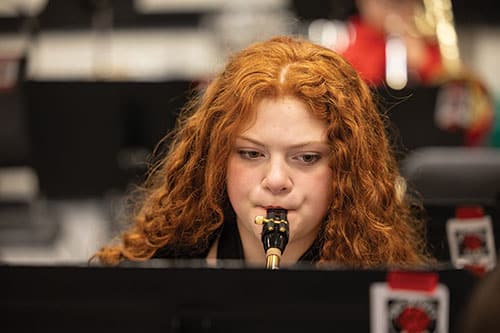
Moving to Louisville, Kentucky in the summer of 1999 was definitely different for me coming from a small town. I had to learn to make friends in a different environment. My academic studies at UofL were amazing, and the professors were excellent. However, the most challenging part was some students implying that I didn’t belong there because I didn’t have the same musical background as they did. I refused to let that discourage me from learning, forming great friendships, and pursuing my dream of becoming a band director.
How did those experiences shape your approach to teaching? Did it spur your passion and strength when you first started teaching?
I would say both. I let my students know I’m different, and you know what, I can’t control my skin color, but I can tell you about my experiences as a musician and the joy I have teaching and playing music. If you focus on problems you cannot control, you will not get where you need to go. I figure out how to reach people who want to listen, and that is what I have done.
How did your teaching career begin?
Three days before I finished my master’s degree, I was supposed to start an extended substitute position for Noe Middle School, where I student-taught with Beth Lyles. She was having a baby, and the program needed a band director. I really wanted to do the job, but I decided to take an interview for a high school position in the district because it was an opportunity I couldn’t miss.
They ended up hiring me for the high school job and said I would start at the end of January. I had no experience as a high school teacher and felt nervous about taking the position. In addition, I was the third director these students had in just a few months. College did not prepare me for this, and I needed to have a strong start in the job.
On my first day, the outgoing high school director introduced me to the students, and I heard them play for the first time. I was shocked because they didn’t play at a high school level. You don’t want to hurt anybody’s feelings, but I had to figure out how to get these students to a higher level of playing. They were signed up for the KMEA assessments, and I knew what selections we would have to rehearse. They weren’t ready to perform, so I went back to the method book and worked on fundamental skills: counting, reading, and breathing.
When I took them to the assessment, I was nervous. Although I had played in top ensembles in school, this time I would have to take the criticism for our performance, not the students. As expected, the judges described everything that was wrong. After it happened, I immediately started working on making them better each year.
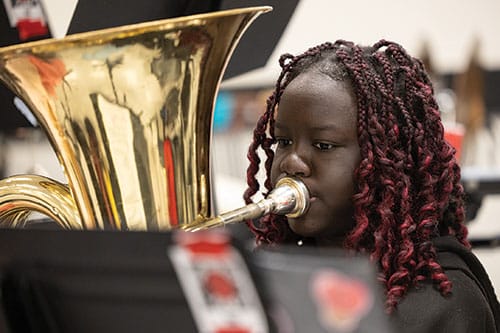
By 2010, I felt good about our progress as we prepared for assessment. My father passed away just before the assessment, and I wondered how to get through it. However, my students were so passionate. They ran rehearsals when I left for a week right before my father passed, and after I came back, we went to the assessment, where they earned straight distinguished ratings for the first time. I thought to myself, “Oh my goodness, these kids can really do it.” I saw the progress and knew they were buying into our work together.
In the community where I taught, I had to work especially hard when I first started. It can be difficult for people to trust you when you say that the students will end up sounding great. The breakthrough at assessment was the next level. A year later, we won a Grammy, an accomplishment for the entire music department. It built confidence that we were doing something right and that success would continue over the years.
Over time, there were challenges in the building and community. After 14 years at the school, it felt like it was time for me to go. When COVID struck, I decided to stay and help the program through the crisis. Then, my phone rang. Beth Lyles called to say she was retiring after 33 years at Noe Middle School, where I student-taught all those years ago. I thought she was joking. Five minutes later, I received a call for an interview. I interviewed and was hired in the middle of the pandemic.
My first group rehearsal took place online. We had band once a week for an hour with the 6th, 7th, and 8th graders, and I helped students play well and stay accountable until we returned to the building, which happened a year later in March 2021. It took all of my communication skills to work with parents and students, to get information out efficiently about picking instruments, and to try to keep the band as normal as possible.
Under the circumstances, they played phenomenally. Students who were in my first 6th grade group are now sophomores in the Youth Performing Arts School. Their parents trust me after our experience with COVID. It took time to build relationships once we were all in the building again. At first, I didn’t change too much in the band room or the format of the program. We focused on playing with a great sound that first year and added more elements to the program in the second year. In my teaching, there is a beginning, a lot of middle, and a bright light that is not the end but shows us where we can go farther. That has always been my approach.
You frequently say that “when you carry an instrument, it will carry you.” What inspired that?
This statement is part inspiration and part matter of fact. I tell students that if your parents buy an instrument, you’d better bring it to class. My parents worked really hard for my brother, my sisters and me to participate in activities, and I tried to respect them by making sure I was practicing. I expect the same from my students.
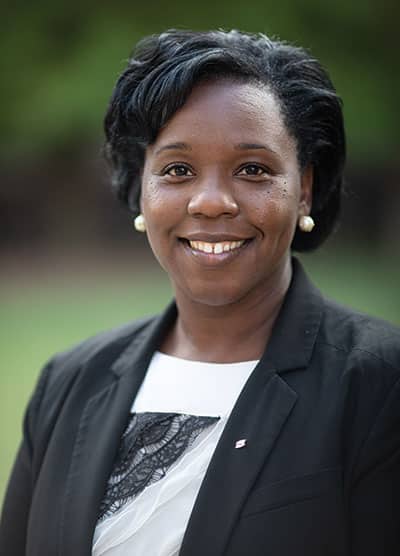
The biggest part of this statement stems back to my time in middle school band when I was inspired by the 8th grade bass clarinet player. Building on her encouragement, I found every way I could to keep playing my instrument. Band was the bright light throughout my childhood. It was something I did well, and I knew that I could contribute to an ensemble. That conversation with another clarinet player lit a fire in me. I carried my instrument every day to school, and even now I bring it. Music has taken me many places I never could have imagined. I have been to Europe going on nine times with students, giving me and them the chance to give concerts and see the world differently.
What mentors were particularly important to your musical journey?
Many people have helped, including some who were not even band directors. There were teachers at Iroquois High School who knew my passion for music, and they were my entourage. They supported the program and always had my back.
Beth Lyles, who I student-taught with, told me to stick with the method book all the time. I did, and it has made a big difference. Dr. Frederick Speck and Dr. Amy Acklin believed in me and told me that you can push these kids farther than they realize. Jerry Tolson, who recently retired from the University of Louisville, and John R. Jones, Jr., who held faculty appointments as professor of tuba and euphonium at Ball State University and the University of Louisville, have encouraged me to keep going and always believed in me.
Dallas Tidwell, my clarinet professor at the University of Louisville was always patient and kind to me. He knew that I wanted to be a band director, but he reminded me that you are always a musician first and to teach your students through your instrument.
Dr. Kevin Callihan, who teaches at the Youth Performing Arts School in Louisville, has helped me think outside the box and encouraged me to apply for conferences and other opportunities I might not have considered. Lois Wiggins was the first Black woman that I saw who was a teacher. She was not my teacher, but it was eye-opening to see somebody who looked like me doing what I wanted to do. I knew I needed to watch her.
What has been your most memorable moment at Noe Middle School?
For our first concert in 2021, we wore masks and only a small number of people could attend. Because of that limitation, I decided to record the concert. The students just wanted to show their friends that they could play and didn’t care about wearing a mask through the concert. These students went through so much in that year and earned my respect by putting on a full concert with a jazz band, 6th-grade band, advanced band, and a routine by the dance department that we accompanied. They shared their love for music and showed that life kept going even during a pandemic. That’s dedication.
How do you structure rehearsals to accomplish your big goals for students?
Organization is the most important thing. Whether teaching high school or middle school, I always have a plan for what’s going to happen in rehearsal. With increasing experience, you learn to identify exactly what parts of each piece need work. You can’t plan in the middle of rehearsal and expect success. At the beginning of my career, I worried so much about discipline that I couldn’t focus on music. I discovered that having a written plan for rehearsals actually led to fewer discipline issues in class. You will spend more time making music and can decide where you want the program to go.
Our planning for the program happens months ahead of time. By December each year, our May and summer and fall activities have been planned. By August, we know what is planned for January-March. Even though you don’t know who will be in your ensemble, that thinking and planning is essential. Students learn the rules and expectations for our program. We practice at home and rehearse at school. Once students learn this, they understand what needs to happen.
What advice do you have for teachers just starting out or partway through their careers and still improving?
For those just beginning, find a mentor, even if it isn’t a music teacher. Balancing teaching and life is difficult. In the beginning, you work extra hard because you want to do well, leaving little time for life outside school. Weekly meetings with a mentor provide a chance to discuss your feelings, address discipline problems, and figure out how to take the program to the next level. Sitting down for coffee or dinner can lead to great progress.
Once you have some experience, find a colleague who inspires you and lights a fire in you to do more. That could be improving your teaching, picking exciting literature, or earning an advanced degree. I want to be around someone who makes me want to do more, and that is what I have done.
Do you have any unusual or favorite teaching techniques for middle school?
Justin Dickson (director at Carroll Magnet Middle School in Raleigh, North Carolina) has all these methods online for learning to read music. It covers nearly everything he does with his program. At one point, he added this starting warm-up for 6th graders, which included something called Beast Mode Challenge. Young students know that if they can play this challenge, they can do anything in music. It helps students develop skill and confidence in moving the air, working on the embouchure, and sitting up straight. It also helps them to play without fear in front of their friends.
I always try to give students confidence by asking them to play something they can do well. I will call out “Who wants to play this exercise for us?” It just takes one brave kid, and then everyone follows along and feels it is safe to try. Students in my class learn that if someone laughs at you because you messed up, that is their problem.
What techniques help you to be efficient and productive when students aren’t around?
When you have planning time, you want to relax, but that doesn’t happen at my school. From the moment you walk into the building to the moment you leave, you work. The hours after jazz band, usually from 5 to 7 pm two nights a week, are my quiet time. No one is in the building. I can make copies, email parents, and plan for the week. We have a weekly email to all parents and students to make sure they know what is going on. I also work on our band website, Google Classroom, and Infinite Campus. Those hours when the traffic is too bad to drive home, make a big difference and get me ready for the next day.
How do you stay fresh and energized in your teaching?
I remember hearing Alfred Watkins say that if you hear somebody talk about burnout, don’t be in the vicinity of that because you are going to start talking about that. We will all have some time when we are exhausted. I realized that we all have to take a break because a negative outlook can really change your view.
A while back, I decided I was spending too many hours at school and checking emails too frequently during the day. I set a daily cut-off time for sending emails and do not look at it on the weekends. As a director, you want to keep going and finding new things for your students. However, taking time to rest is what is best for you, your students, and their families. If you are not rested, you are not going to be fierce and fabulous.

